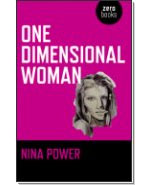Below is an excerpt from Nina Power’s One Dimensional Woman, in which she raises some interesting points and questions about the so-called Bechdel Test (or Ripley’s Rule, as we generally refer to it).
What does contemporary visual culture say about women? Here a thought experiment comes in handy: The so-called ‘Bechdel Test’, first described in Alison Bechdel’s comic strip Dykes to Watch Out For, consists of the following rules, to be applied to films, but could easily be extended to literature:
- Does it have at least two women in it,
- Who [at some point] talk to each other,
- About something besides a man.
Writer Charles Stross adds that
“if you extend #3 only slightly, to read “About something besides men or marriage or babies, you can strike out about 50% of the small proportion of mass-entertainment movies that do otherwise seem to pass the test.”
Once you know about the test, it’s impossible not to apply it, however casually. Stross is right–huge quantities of cultural output (possibly even more than he suggests) fail. Several questions emerge from the test:
-
What is so frightening about women talking to each other without the mediation of their supposed interest in men/marriage/babies?
-
Does cinema/literature have a duty to representation such that it is duty bound to include such scenes, as opposed to pursuing its own set of agendas? Why should literature/cinema be ‘realistic’ when it could be whatever it wants to be?
-
Does reality itself pass the test? How much of the time? Can we ‘blame’ films/TV for that?
Nina Power is a Senior Lecturer in Philosophy at Roehampton University. She has published widely on topics including Iran, humanism, vintage pornography and Marxism. (taken from the jacket cover of One Dimensional Woman.)


One of the things I like most about Bitch Flicks is that you have Ripley’s Rebuke. It shows that you’re aware of the test while acknowledging its limitations. So many times I read about how people are using it uncritically.
As for the questions raised above I’m a bit worried about number 3. Is it a joke I’m not getting? I can see why in films women might not have conversations about things other than men (although obviously I’d prefer more well-rounded female characters) but in real life? Unless a woman only associates with men or is very, very boring how can reality not pass the test?
Hi soirore,
I was actually wondering the same thing. Is she arguing that women watch films/TV, see themselves represented as people who talk to one another about babies and men, and then subsequently spend most of their real lives talking about those things with other women? I’m confused. Is she joking?
Amber, you’ve read the whole book. Help!
Hi there, google told me you were discussing this! (Nice site btw). My point 3 is a sort of joke – more a kind of exasperated hypothetical, in keeping with the rest of the book, which is rather angry in tone (I’m much less angry now – oh hang on, no, I’m much more angry). The whole book is about how consumer culture offers various forms of false emancipation (which is a pretty obvious point, for sure). Here I’m wondering whether there is a sinister aspect to the influence films have on how we conceive of female friendship, given what the Bechdel test reveals (really like the Ripley’s Rebuke idea btw – esp. with regard to Vicky Cristina Barcelona – a truly odious film). It’s certainly not to suggest that women are as one-dimensional as their cinematic depictions usually are, just that there is a culture out there that finds it easier to imagine they are and sell things to women accordingly. But it’s not explored in as much detail in the book as it should be, for sure.
Thanks for your comments–especially Ms. Power. Glad you found our site!
I hadn’t thought about a misreading and/or confusion about the tone of point 3 divorced from the context of the book (although point 2 does acknowledge a reality that passes the text). Even with its cheeky tone, point 3 asks an important question and extends the Bechdel Test from a tool of feminist film analysis to feminism itself–in a culture that believes/wants to believe that reality doesn’t pass the test, how often do we go along with the program?
What I like most about the Bechdel Test/Ripley’s Rule is its simplicity. Since beginning the Bitch Flicks project almost three years ago, one of our key aims has been to bring a mainstream readership into a critical discussion of women in/and film. One can have a conversation with virtually anyone about Ripley’s Rule; Laura Mulvey’s theory of the male gaze, for example, doesn’t get much play outside of the academy.
I’m actually most interested in question 2 and the notion that cinema “could be whatever it wants to be,” as if cinema itself had agency. What are the agendas of cinema? Unfortunately, and particularly in Hollywood, the only agenda is profit. What are we to do with this fact? I’m often put off by the calls to spend my entertainment dollars on woman-centered films, as this is merely a consumer solution (and a weak one, at that) to a structural societal problem. One of my favorite points in the book is the criticism of selling feminism as just another consumer product.
ah it makes sense now; I wasn’t reading with full brain yesterday. Sorry I didn’t add anything to the discussion; there are so many interesting issues here too….
Anyway, it seems I’m going to have to read the whole book; looks ace